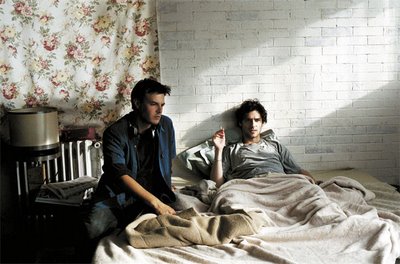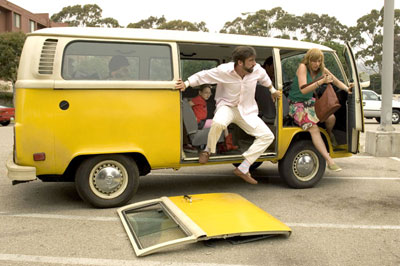
Written and Directed by Francois Ozon
To a great extent, the premise of French director, Francois Ozon’s latest film, LE TEMPS QUI RESTE, reads like a daytime drama storyline. An attractive 31-year-old photographer is told he has an extreme cancer that has spread through his body. It cannot be removed and, though treatment is an option, he does not have a strong chance of survival. He has but a few months left to live. What elevates this film above the potential for clichéd melodrama is the way the photographer, Romain (played by Melvil Poupaud), reacts to this news. He has little time to resolve his life and relationships. He has little time to fully embrace who he is. Yet he does not make peace with everyone in his life, one by one. Instead, he avoids the whole damn thing. Only, as he avoids, he manages to find the foundation of these relationships and begins to understand their significance, how they have helped shape the man he is. He puts his life into perspective his way and finds out that all this time, despite his selfish existence, he has also been a part of something much bigger.
LE TEMPS QUI RESTE is thankfully brief as no one wants to spend too much time watching someone die. It does however make the most of the time it has. When Romain first learns the news, he avoids sharing it with anyone in his life, from his family to his boyfriend to his employer. As he sits at a family dinner and people ask what is new in his life, it is painful to watch him say nothing, especially as he continues to withdraw. Poupaud’s performance humbles Romain as he goes from cocky and assured to constantly being overwhelmed by his own grief. He looks afraid to say that he is dying, to make it real, to place that pain on anyone else. Instead, he buries it and suffers silently. You want so much for him to reach out to the people who clearly love him that when he doesn’t, you just want to wrap your own arms around him. When he finally does share the news, his choice of confidante is calculated. He chooses to tell someone who can understand because, as Romain so plainly puts it, she too will be dying soon.

Along with Romain, the viewer has some resolution, some peace brought back to a time of chaos. Romain spends so much time convincing himself that the people around him do not need nor deserve to know about his condition because their relationships are so complicated. Only his solitude brings him the clarity necessary to remember how these relationships began. More importantly, these memories are the ones he associates most cleanly with naïve, unchecked happiness. With death imminently waiting for him, the search for happiness that he gave up on is rejuvenated when he sees how close he was to it all the while. Romain’s memories come to him at random moments and their nature demonstrates the talent of Ozon as writer and director. They are simple memories that may have seemed all too simple at the time they took place but these memories went on to bring Romain closer to others and himself. And as the memories come more frequently, he learns to integrate them into his current reality. Thus when he goes, he goes having lived a short but full life.
Death is a construct, an inevitability, a mystery, a fear to face. In LE TEMPS QUI RESTE, it is also a process that is nothing more than the last clue to understanding your life. In Romain’s final moments, death becomes necessary to complete the journey, a journey that would mean nothing at all if it weren’t ending to begin with.






